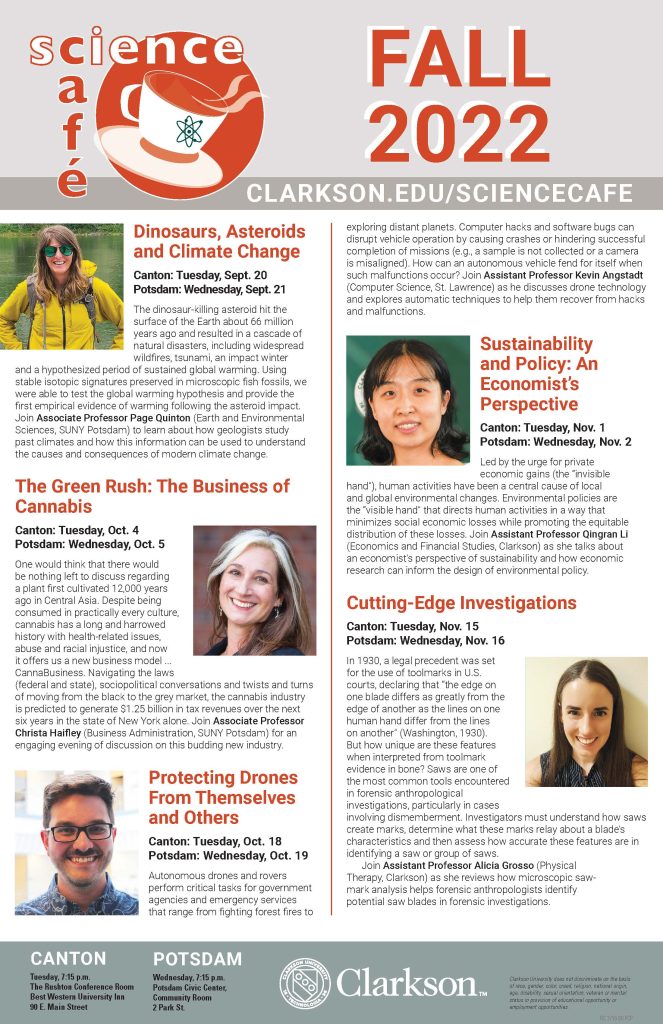After two years of virtual events, Clarkson University Science Cafes will return in person this fall on Tuesday, September 20 in Canton, and Wednesday, September 21 in Potsdam with Dinosaurs, Asteroids and Climate Change.

The dinosaur-killing asteroid hit the surface of the Earth about 66 million years ago and resulted in a cascade of natural disasters, including widespread wildfires, tsunami, an impact winter and a hypothesized period of sustained global warming. Using stable isotopic signatures preserved in microscopic fish fossils, we were able to test the global warming hypothesis and provide the first empirical evidence of warming following the asteroid impact. Join Associate Professor Page Quinton (Earth and Environmental Sciences, SUNY Potsdam) to learn about how geologists study past climates and how this information can be used to understand the causes and consequences of modern climate change.
Next up, is The Green Rush: The Business of Cannabis in Canton on Tuesday, October 4, and Wednesday, October 5 in Potsdam.
One would think that there would be nothing left to discuss regarding a plant first cultivated 12,000 years ago in Central Asia. Despite being consumed in practically every culture, cannabis has a long and harrowed history with health-related issues, abuse and racial injustice, and now it offers us a new business model … CannaBusiness. Navigating the laws (federal and state), sociopolitical conversations and twists and turns of moving from the black to the grey market, the cannabis industry is predicted to generate $1.25 billion in tax revenues over the next six years in the state of New York alone. Join Associate Professor Christa Haifley (Business Administration, SUNY Potsdam) for an engaging evening of discussion on this budding new industry.
On Tuesday, October 18 and Wednesday, October 19, is Protecting Drones From Themselves and Others.
Autonomous drones and rovers perform critical tasks for government agencies and emergency services that range from fighting forest fires to exploring distant planets. Computer hacks and software bugs can disrupt vehicle operation by causing crashes or hindering successful completion of missions (e.g., a sample is not collected or a camera is misaligned). How can an autonomous vehicle fend for itself when such malfunctions occur? Join Assistant Professor Kevin Angstadt (Computer Science, St. Lawrence) as he discusses drone technology and explores automatic techniques to help them recover from hacks and malfunctions.
Sustainability and Policy: An Economist’s Perspective is the topic on Tuesday, Nov. 1 and Wednesday, Nov. 2.
Led by the urge for private economic gains (the “invisible hand”), human activities have been a central cause of local and global environmental changes. Environmental policies are the “visible hand” that directs human activities in a way that minimizes social economic losses while promoting the equitable distribution of these losses. Join Assistant Professor Qingran Li (Economics and Financial Studies, Clarkson) as she talks about an economist’s perspective of sustainability and how economic research can inform the design of environmental policy.
The final Science Cafe of the season, Cutting-Edge Investigations, will be held on Tuesday, Nov. 15 and Wednesday, Nov. 16.
In 1930, a legal precedent was set for the use of toolmarks in U.S. courts, declaring that “the edge on one blade differs as greatly from the edge of another as the lines on one human hand differ from the lines on another” (Washington, 1930). But how unique are these features when interpreted from toolmark evidence in bone? Saws are one of the most common tools encountered in forensic anthropological investigations, particularly in cases involving dismemberment. Investigators must understand how saws create marks, determine what these marks relay about a blade’s characteristics and then assess how accurate these features are in identifying a saw or group of saws.
Join Assistant Professor Alicia Grosso (Physical Therapy, Clarkson) as she reviews how microscopic saw mark analysis helps forensic anthropologists identify potential saw blades in forensic investigations.
Traditionally, Science Cafés have brought together local university and college professors and townspeople in relaxed, informal settings, such as coffeehouses and pubs. The speaker will make a presentation about a topic in their field and, as always, there will be plenty of time for questions and discussion.
The Canton events will be held Tuesdays at 7:15 p.m. in The Rushton Conference Room in the Best Western University Inn at 90 E. Main Street, Canton. The Potsdam events are held on Wednesdays at 7:15 p.m. in the Potsdam Civic Center Community Room at 2 Park St.
Would you like to be added to our email list and receive regular information and reminders? Just email sciencecafe@clarkson.edu and ask us to add you to the list.
The Science Café is sponsored by Clarkson University School of Arts & Sciences, Potsdam NY.
https://www.clarkson.edu/news/clarkson-university-science-cafes-return-person-fall